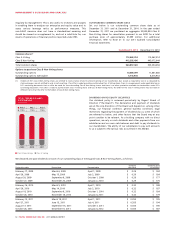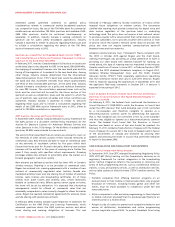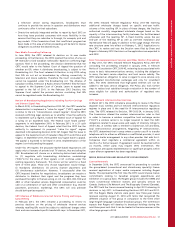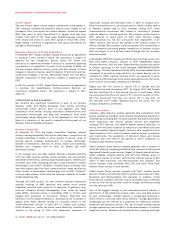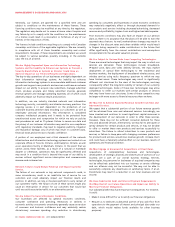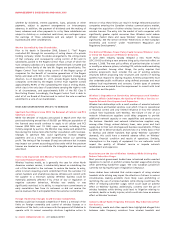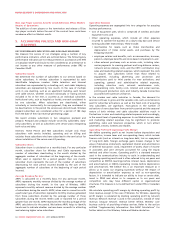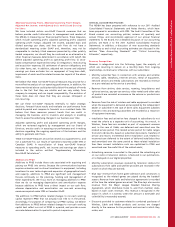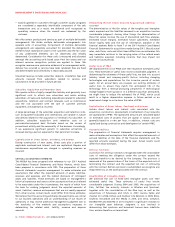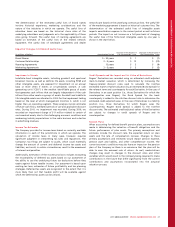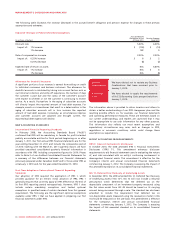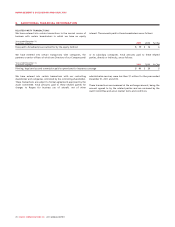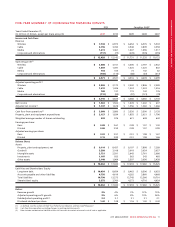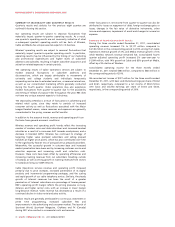Rogers 2011 Annual Report Download - page 66
Download and view the complete annual report
Please find page 66 of the 2011 Rogers annual report below. You can navigate through the pages in the report by either clicking on the pages listed below, or by using the keyword search tool below to find specific information within the annual report.MANAGEMENT’S DISCUSSION AND ANALYSIS
whether by dividends, interest payments, loans, advances or other
payments, subject to payment arrangements on intercompany
advances. In addition, the payment of dividends and the making of
loans, advances and other payments to us by these subsidiaries are
subject to statutory or contractual restrictions, are contingent upon
the earnings of those subsidiaries and are subject to various
businesses and other considerations.
We Are Controlled by One Shareholder.
Prior to his death in December 2008, Edward S. “Ted” Rogers
controlled RCI through his ownership of voting shares of a private
holding company. Under his estate arrangements, the voting shares
of that company, and consequently voting control of RCI and its
subsidiaries, passed to the Rogers Control Trust, a trust of which the
trust company subsidiary of a Canadian chartered bank is trustee and
members of the family of the late Mr. Rogers are beneficiaries. The
Rogers Control Trust holds voting control of the Rogers group of
companies for the benefit of successive generations of the Rogers
family and deals with RCI on the company’s long-term strategy and
direction. As of December 31, 2011, private Rogers family holding
companies controlled by the Rogers Control Trust together owned
approximately 90.9% of the outstanding RCI Class A Voting Shares,
which class is the only class of issued shares carrying the right to vote
in all circumstances, and approximately 9.6% of the RCI Class B
Non-Voting Shares. Accordingly, the Rogers Control Trust is able to
elect all of our Board of Directors and to control the vote on matters
submitted to a vote of our shareholders.
RISKS AND UNCERTAINTIES SPECIFIC TO WIRELESS
Spectrum Fees May Increase With the Renewal of Cellular and PCS
Spectrum Licences
While the Minister of Industry announced in March 2011 that the
previously-existing annual fee of $0.0351 per MHz per population of
the licenced area would continue to apply to all cellular and PCS
licences (850 MHz and 1.9 GHz) upon renewal, including those
initially assigned by auction, the Minister may review and amend the
fees during the licence term after further consultation with licencees.
Changes to spectrum fees could significantly increase Rogers’
payments and as a result, could materially reduce our operating
profit. The timing of fee increases (if any) are unknown but increases
may impact our current accounting policies under which the spectrum
licences are treated as an indefinite life intangible asset and are not
amortized.
There is No Guarantee that Wireless’ Service Revenue Will Exceed
Increased Handset Subsidies.
Wireless’ business model, as is generally the case for other North
American wireless carriers, is substantially based on subsidizing the
cost of the handset to the customer to reduce the barrier to entry,
while in return requiring a term commitment from the customer. For
certain handsets and smartphone devices, Wireless will commit with
the supplier to a minimum subsidy. Wireless’ business could be
materially adversely affected if by virtue of law or regulation or
negative customer behaviour, Wireless was unable, or was
significantly restricted in its ability, to require term commitments or
early cancellation fees from its customers or did not receive the
service revenues that it anticipated from the customer commitment.
Foreign Ownership Changes Could Increase Competition.
Wireless could face increased competition if there is a removal of the
limits on foreign ownership and control of wireless licences or a
relaxation of the limits, such as seen with the approval of Globalive to
operate with its current ownership structure. Legislative action to
remove or relax these limits can result in foreign telecommunication
companies entering the Canadian wireless communications market,
through the acquisition of either wireless licences or of a holder of
wireless licences. The entry into the market of such companies with
significantly greater capital resources than Wireless could reduce
Wireless’ market share and cause Wireless’ revenues to decrease
significantly. See the section entitled “Restrictions on Non-Canadian
Ownership and Control” under “Government Regulation and
Regulatory Developments”.
The National Wireless Tower Policy Could Increase Wireless’ Costs
or Delay the Expansion of Wireless’ Networks.
In June 2007, Industry Canada released a new Tower Policy
(CPC-2-0-03) outlining a new antenna siting policy that took effect on
January 1, 2008. The new policy affects all parties that plan to install
or modify an antenna system, including PCS, cellular and broadcasting
service providers. Among other things, the policy requires that
antenna proponents must consider the use of existing antenna
structures before proposing new structures and owners of existing
systems must respond to sharing requests. Antenna proponents must
also undertake public notification using defined processes and must
address local requirements and concerns. Certain types of antenna
installations are excluded from the requirement to consult with local
authorities and the public.
Wireless is Dependent on Certain Key Infrastructure and Handset
Vendors, Which Could Impact the Quality of Wireless’ Services or
Impede Network Development and Expansion.
Wireless has relationships with a small number of essential network
infrastructure and handset vendors, over which it has no operational
or financial control and only limited influence in how the vendors
conduct their businesses with Wireless. The failure of one of our
network infrastructure suppliers could delay programs to provide
additional network capacity or new capabilities and services across
the business. Handsets and network infrastructure suppliers may,
among other things, extend delivery times, raise prices and limit
supply due to their own shortages and business requirements. If these
suppliers fail to deliver products and services on a timely basis or fail
to develop and deliver handsets that satisfy Wireless’ customers’
demands, this could have a material adverse effect on Wireless’
business, financial condition and results of operations. Similarly,
interruptions in the supply of equipment for our networks could
impact the quality of Wireless’ service or impede network
development and expansion.
Restrictions on the Use of Wireless Handsets While Driving May
Reduce Subscriber Usage.
Most provincial government bodies have introduced and/or enacted
legislation to restrict or prohibit wireless handset usage while driving
while permitting hands-free usage. The only Canadian jurisdiction
currently not having this type of legislation is Nunavut.
Some studies have indicated that certain aspects of using wireless
handsets while driving may impair the attention of drivers in various
circumstances, making accidents more likely. Laws prohibiting or
restricting the use of wireless handsets while driving could have the
effect of reducing subscriber usage, which could cause an adverse
effect on Wireless’ business. Additionally, concerns over the use of
wireless handsets while driving could lead to litigation relating to
accidents, deaths or bodily injuries, which could also have an adverse
effect on Wireless’ business.
Concerns About Radio Frequency Emissions May Adversely Affect
Our Business.
Occasionally, media and other reports have highlighted alleged links
between radio frequency emissions from wireless handsets and
62 ROGERS COMMUNICATIONS INC. 2011 ANNUAL REPORT


